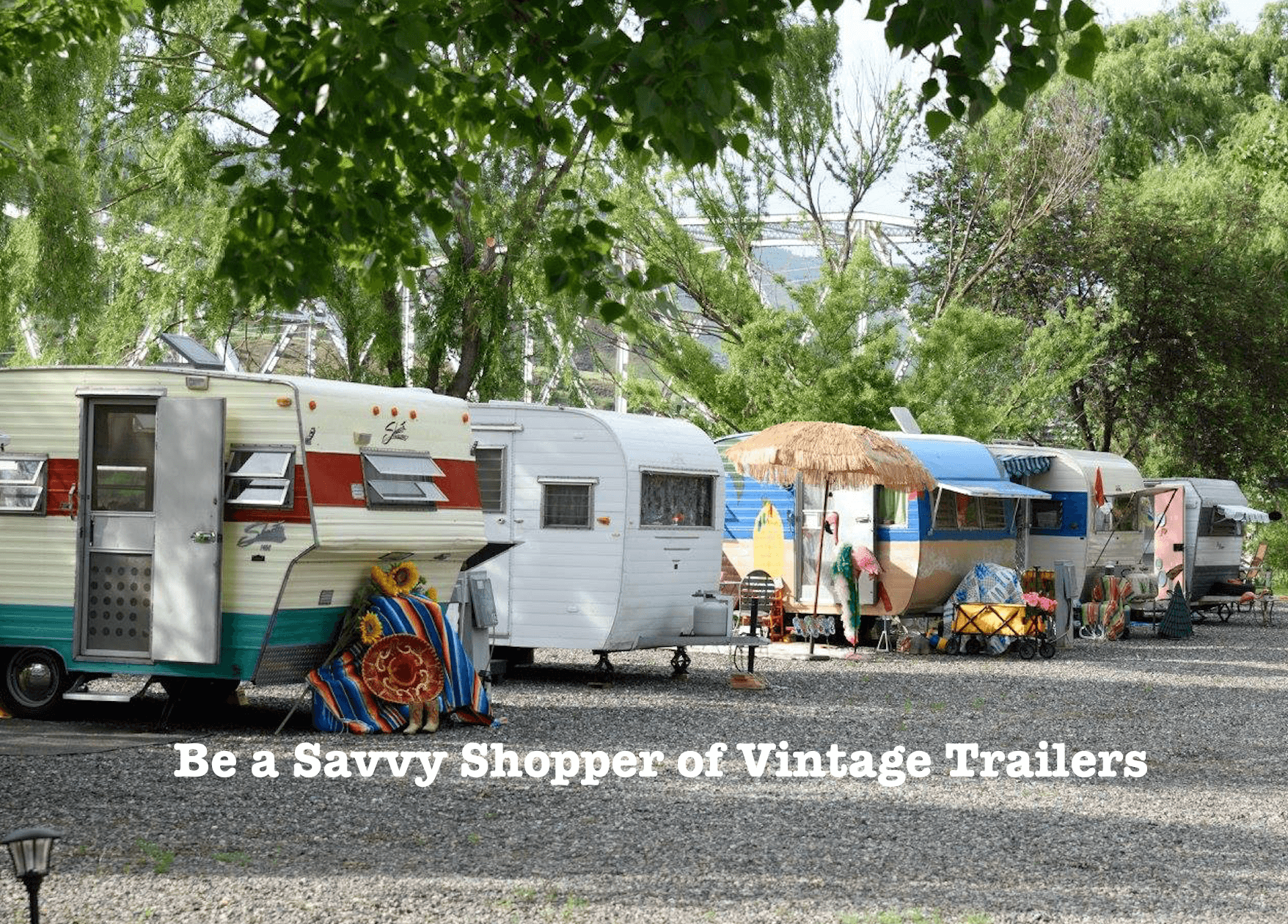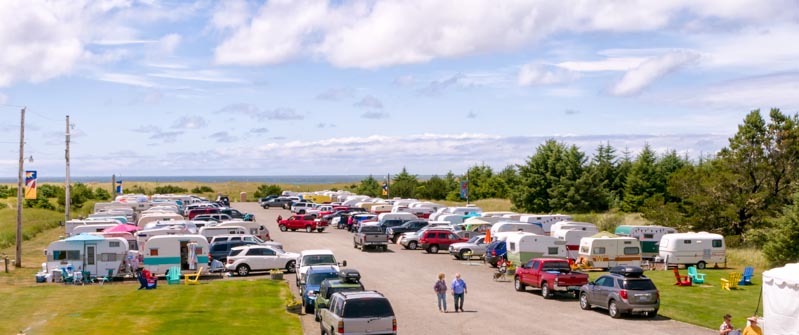

Be a Savvy Shopper of Vintage Trailers
Anna Ousley, SOTF # 3206 & Swiftwater RV Park owner, has contributed this article. Her vast knowledge of vintage trailers & what to look for when shopping for one is shared here.
*****
WHERE TO START
Tempted to buy and restore a vintage travel trailer? It can be a big step! There are plenty of fully restored ‘toothbrush ready’ vintage trailer beauties on the market to buy – all you have to do is dole out the cash, back up and hook it on to your vehicle’s hitch, throw in your toothbrush, and hit the road for camping adventures.
If your budget doesn’t allow that approach, or if it just seems like loads of fun to find a ‘diamond vintage trailer in the rough’, first become a savvy vintage trailer buyer. Some of my friends like to hop in their rigs and ‘troll for trailers’, but they do so with eyes wide open. Want to join them? Put to use the following pointers to ensure your vintage travel trailer experience is long-lasting and happy!
TITLE
In my mind, the very first question to ask the seller – whether in person, on the phone, or by email– is about the trailer’s title. Is it valid? If only a Bill of Sale is available, you could end up with a trailer that’s been stolen or has a pile of old liens on it. Not a good way to start, so the rule of thumb: No title? Walk away…. fast! However, if the buyer assures you the title is good, then let’s get started!
INSPECTION
Bring a couple things when inspecting a vintage travel trailer for the first time- don’t go empty handed. Take with you a ladder, headlamp and/or flashlight, screwdriver, ice pick, electric outlet tester (small appliance like a hair dryer), camera and notepad (digital or old-fashioned paper & pen).
JUDGE THIS BOOK BY ITS COVER
The most knowledgeable folks recommend that initially, it’s best to stay outside! Plan on spending up to a half an hour with the exterior inspection. A thorough outside investigation helps you stay realistic before stepping inside the trailer and subsequently falling in love with the interior cuteness or ‘potential.’
Here’s where some of those tools come into play. Climb up the ladder to inspect the roof – how is the roof firmness, seal job, paint condition, and status of areas around the vents?
Next, look underneath the trailer. Get down on your hands and knees – even strap that headlamp on then lay on your back and scoot underneath the trailer to check the under carriage. Literally poke the underside. Is it soft anywhere? Is there rot around the wheel wells? My friend Geri recommends to pay close attention to the underside skin….is it intact and without holes? How does the axle look? Does it show signs of stress?
Then, stand up to walk all around the trailer, opening each cargo door. Closely look at the bottom and walls where they meet. You don’t want to see water stains or feel softness! What about a rock guard? (The adjustable cover over the front window). My friend Juli – who owns at least five vintage beauties – says it’s okay without one, but the glass can cost a lot to replace if a rock hits it going down the road.
Remember to inspect the under chassis and then the drawbar that attaches it to your vehicle. Is it solid? Replacing metal structures can add another $1000!
At each of these areas – top, bottom & sides – snap pictures and start a list of everything that needs to be fixed, repaired, or updated.
THE INNER SANCTUM
Don’t stop and go ga-ga over the adorable appliances, fixtures, or layout! With camera in hand and notepad nearby, open every cupboard and storage compartment to find current or past damage from water leaks. Use the flashlight or headlamp to look inside and check for softness or water stains or other types of damage – especially where the bottoms & tops meet the sides. Pull back all cushions and do the same with carpeting, floor rugs, or window curtains. Some folks take along a moisture meter to really scrutinize the water issue.
My friend Melanie suggests jumping up and down on several areas of the floor to make sure there are no soft spots! Put that ice pick to use. Anywhere water damage is apparent, nicely stick the ice pick through the wall, preferably at a seam, to see if the wood below is soft. If the floor is rotted, it really can’t be properly repaired without removing the trailer frame – which probably isn’t worth the trouble!
Focus on every inch of the ceiling, from where it joins the walls to the areas around vents. Don’t be afraid to touch and push! Open and close every window, noting any difficulties or missing pieces. Sit inside the trailer and face the door after you’ve firmly closed it. Are there any gaps around the frame? Check the electricity and if at all possible, plug in the trailer to an outlet to ensure the interior lights work. Plug that small appliance you brought with you into every outlet .
If any of the above scrutiny reveals problems that need fixing, another $1,000+ can disappear from your bank account – seems like everything adds up quickly, from flooring, curtains, upholstery to window glass, etc. Keep using your camera and adding items to the ‘negotiation’ list!
“WHAT ELSE?” IS KEY!
WEIGHT
Many vintage trailers, the ‘canned ham’ types especially, are petite and thus aren’t so heavy that they can’t be easily towed with a small SUV vehicle. Pay attention to this detail. Read your vehicle’s manual to understand the maximum weight it can pull. Remember that when you own the trailer and fill it with all your ‘stuff’, the weight increases. Otherwise – as friend Geri points out – you may end up buying an inexpensive vintage trailer, and a very expensive tow vehicle!
KEYS
Are there working keys to the door and all the cargo doors?
PROPANE TANK
It should be updated as the older ones can no longer be filled, so those old tanks need to be replaced. Can you tell if the propane tank hoses are in good condition, or are they cracked and dry? After buying the trailer but before using any gas appliances, ensure gas fittings and connections are checked by someone licensed in this area.
JACKS
Are they provided with the trailer, and do they work?
SPARE TIRE
Is it there? Is it a decent one that could be used if required? Does it have a wheel?
TIRES
Rubber deteriorates rather quickly in the elements, especially if the trailer has been sitting for awhile, so inspect tires and ask about the trailer’s recent use. Inquire when the bearings were last packed. (Tires and bearings can be worth about $200-$250). Some people even jack up the trailer to remove the tires and take them to a local tire dealer for inspection!
OLD CONSTRUCTION
Vehicles built over 30 years ago may contain substances such as leaded paint and flooring, stove/fridge back boards and even some interior panels may contain asbestos. Pay attention! Wear gloves and masks when removing or restoring some of the older material.
SAFETY CHAINS
Are they present? In good usable condition?
STOVE
Does it work?
LIGHTS
Brakes, marker lights and turn signals should all be tested.
Finally…..
THE SELLING PRICE
What price should you pay for a vintage trailer? The answer certainly depends on the condition. If the price tag is over $1,500, it better be “camp-able” as is and ready to roll! When the asking price is over $1,500 and the trailer is structurally solid and all systems work, the additional money should take into account your happiness regarding bathroom/no bathroom, desirability of make and model, refrigerator vs ice box, attractive floor plan and how much cosmetic work is potentially needed. On the other hand, expect to pay between $1,200 to $1,500 for something roadworthy and functional inside. Some people say that if the title is good, but there is lots of damage, a price of $500 is fair for a good title and trailer frame.
BE REALISTIC
Ready to take the challenge and become a vintage trailer owner? Keep in mind what my friend Juli recommends: “If you aren’t excited about the trailer itself, don’t try to talk yourself into it. This will be your ‘other boyfriend/girlfriend,’ so you need to like it without big reservations!”
Friend Geri again recommends being firm in the knowledge of your own skills and limitations. Ascertain whether you are capable of doing substantial repairs if you buy a cheap fixer-upper, or whether you should buy that “toothbrush ready” camping trailer that you can just add your decorator touch to and go.
Thanks for reading this article. If you’re ever in the White Bird, ID area, please stop in at my l’il piece of heaven by the Salmon River, and say ‘Howdy’! Will be fun to visit
Anna. O
Swiftwater RV Park
White Bird, ID









This was extremely helpful. Thank you for writing this article!!!
Thank you for the info. Very useful. Any ideas where to look for a vintage camper? (Kinda new at this)
So glad I read this. Just found a fitted trailer for $5,800. It will cost me more to buy appliances! and who knows what’s under the new floors! Thinking I’ll go with a new one.
That was Gutted trailer!
I want to thank you for this article. It seems I am seeing many campers that are in the $10,000 to $20,000 range. There is NO WAY I could even consider paying that much. Looks like the back seat for me! 🙂 I am on the hunt and hopefully will find something wonderful soon. Thanks again for the wonderful article!
Extremely helpful article. I am new to campers and am finding them to be what I consider way over-priced. This confirms that I was right, they are over priced. At least the vintage ones are. I love the look of the vintage campers but I don’t think I can shell out that kind of money just for nostalgia.
Thank you so much for the article. It was very informative and I learned things I wouldn’t have thought about without reading it. Like crawling underneath or checking for weakness with ice pick…
Great info! We can’t seem to find anything here for less than $6500-10K!
Great advice! When I “bought” my 1961 Little Bitty on a trade for a motorcycle 20 years ago, we were lucky it had been in use for most of its life. Over time we updated the electric, gas lines and repaired water damage under the windows. Sealing the roof is paramount. Maintaining a vintage unit takes vigilance, so be ready for a long intimate relationship!
Peggy Sister #2305